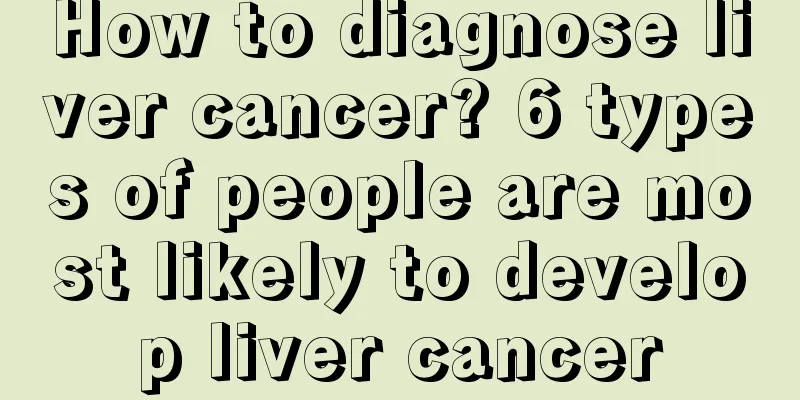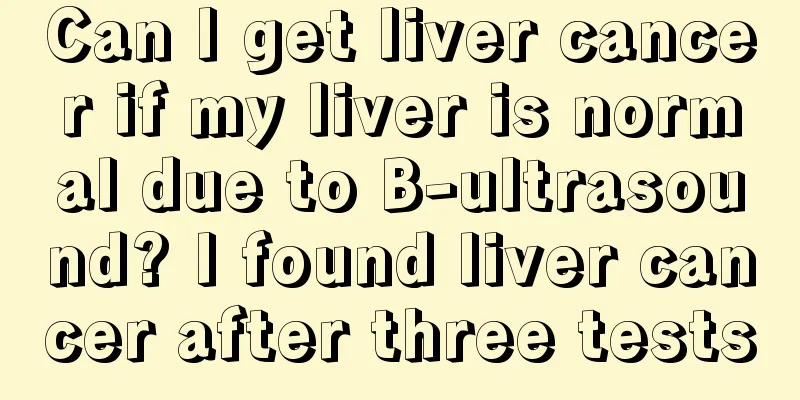How to diagnose liver cancer? 6 types of people are most likely to develop liver cancer

|
Liver cancer is highly malignant and progresses quickly. Patients usually do not feel any discomfort in the early stages. Once symptoms appear, they are often in the middle or late stages. Therefore, it is difficult to treat and has poor efficacy. Generally, the survival time after onset is only 6 months. It is known as the "king of cancer". In my country, 110,000 people die of liver cancer each year, including 80,000 men and 30,000 women, accounting for 45% of the deaths from liver cancer worldwide. As the most common malignant tumor, the mortality rate of liver cancer is second only to gastric cancer. Some people with liver cancer often ask, why do I get liver cancer when other people are healthy? Are you a liver cancer patient? 1. People with a family history of liver cancer On the one hand, many inherited diseases that damage the liver, such as pigmentation disease and glycogen storage disease, will develop into cirrhosis, and the incidence of liver cancer is also very high; on the other hand, it is believed that the familial clustering of liver cancer is mainly caused by the clustering of hepatitis B virus. There is currently no evidence that liver cancer can be inherited. 2. Patients with post-hepatitis cirrhosis More than 50% of patients with cirrhosis develop cancer, and most of them have recurrent symptoms, poor liver function improvement, and frequent complications such as ascites. 3. People living in areas with a high incidence of liver cancer The high incidence areas of liver cancer in China are mainly in the southeastern coastal areas, such as Fusui and Longan in Guangxi, Xiamen and Tongan in Fujian, Qidong and Haimen in Jiangsu, Chongming and Nanhui in Shanghai, etc. In these areas, at least 30 people die of liver cancer per 100,000 people. In addition, the incidence of liver cancer is higher in coastal areas than in inland areas, and higher in southeastern and northeastern regions than in southwest and northwest regions. 4. Long-term alcoholism Long-term alcohol abuse can significantly damage liver cells and lead to malnutrition, making the liver prone to cirrhosis, which can develop into liver cancer. Of course, in addition to the above dietary factors, hepatitis B, parasitic diseases in the liver (such as Clonorchis sinensis), and genetic susceptibility are also closely related to the occurrence of liver cancer. It should be pointed out here that when the above two factors come into play, liver cancer is more likely to occur, such as hepatitis B and aflatoxin exposure, which will cause the disease faster. Alcohol poisoning can also cause alcoholic fatty liver, alcoholic hepatitis, and alcoholic cirrhosis. In alcoholic hepatitis or cirrhosis, the number of Kupffer cells decreases, which can increase the occurrence of liver cell cancer. 5. Gene mutation Mutagens and viruses in the environment stimulate the activation of liver cell division response pathways, causing point mutations and gene translocations in cells, which are possible factors that accelerate the proliferation of cancer cells. 6. Drinking water is unhealthy Water is an important substance for maintaining the normal survival of human organisms. Water itself certainly does not cause tumors, but epidemiological surveys have shown that the degree of drinking water pollution is positively correlated with the incidence of liver cancer. This undoubtedly indicates that there are carcinogens in the water source, and it may be the combined effect of multiple carcinogens, such as humic acid, blue-green algae toxins, etc. How is liver cancer diagnosed? Recommend several common types of liver cancer 1. Cirrhosis Liver cancer often occurs on the basis of liver cirrhosis, and it is often difficult to differentiate between the two. Differentiation depends on a detailed medical history, physical examination and laboratory tests. Cirrhosis develops slowly and has recurrences, with more significant liver damage, and a positive serum alpha-fetoprotein (AFp) often indicates cancer. 2. Extrahepatic tumors adjacent to the liver For example, gastric cancer, upper abdominal high retroperitoneal tumors, kidney, adrenal gland, colon, pancreatic cancer and retroperitoneal tumors are easily confused with primary liver cancer. In addition to the fact that alpha-fetoprotein is mostly negative, which can help to distinguish them, different medical history and clinical manifestations, especially ultrasound, CT, MRI and other imaging examinations, gastrointestinal X-ray examinations, etc. can all make differential diagnosis. 3. Secondary liver cancer Compared with primary liver cancer, secondary liver cancer develops slowly and has milder symptoms. The most common type of secondary liver cancer is gastric cancer, followed by lung, colon, pancreas, breast, etc. Cancer foci often metastasize to the liver. It often presents as multiple nodular lesions. Alpha-fetoprotein (AFp) tests are generally negative, except for a few cases where the primary cancer is in the digestive tract. Can early liver cancer be cured? Experts say that liver cancer tumors with a diameter of less than 2 cm are called very early liver cancer, those with a diameter of between 2 and 5 cm are called early liver cancer, and those with a diameter of more than 5 cm are called large liver cancer, which means they have entered the middle or late stages. Early liver cancer is generally asymptomatic clinically and is mostly discovered during physical examinations. B-ultrasound can indicate low-density space-occupying lesions. Blood tests show elevated AFp in 60% to 70% of cases, but some patients still do not have elevated AFp. Currently, there are many treatments for liver cancer, including liver resection, radiofrequency ablation, vascular interventional therapy, liver transplantation, and targeted drug therapy. Can early liver cancer be cured? Experts say that early liver cancer can be cured. Liver resection can be considered for early liver cancer, which can achieve curative treatment. If you are afraid of surgery, you can choose radiofrequency ablation, which is to insert a needle through percutaneous puncture and perform thermal ablation treatment on the tumor under the guidance of B-ultrasound. Radiofrequency ablation is very effective for small liver cancers with a diameter of less than 2 to 3 cm, and sometimes it can achieve curative treatment. In short, liver cancer is a treatable disease. The key is early diagnosis and early treatment. Especially for people with chronic hepatitis, they should have regular physical examinations every year. Further reading: Bitter melon is a "good medicine" for preventing liver cancer The bitter melon in bitter melon is known as the "fat killer". The fresh juice of bitter melon contains bitter melon glycosides and insulin-like substances, which have a good blood sugar-lowering effect and can reduce the intake of fat and polysaccharides. In addition, bitter melon can also reduce the occurrence of liver cancer. Bitter melon is rich in dietary fiber and vitamin C, which is nearly three times that of tomatoes. Vitamin C is an excellent antioxidant that can improve the body's stress resistance. The active ingredients in bitter melon can inhibit the canceration of normal cells, promote the recovery of mutant cells, have a certain anti-cancer effect, and reduce the risk of liver cancer. |
Recommend
How to defecate when you have severe constipation?
Constipation is a very common symptom in life. Mo...
How to improve memory instantly and effectively
Improving memory is what many friends want to ach...
Can vinegar soften bone spurs?
Vinegar is an important condiment in people's...
Is there any treatment for a thyroid cancer patient who has metastasized to the brain?
At present, the diagnosis has been confirmed and ...
Can the blood of rectal cancer be transmitted if it comes into contact with the hands
Cancer is caused by cell malignancy and is a cell...
The difference between fried dough stick powder and flour
There are some differences between fried dough st...
What causes pituitary tumors
What causes pituitary tumors? I believe this is a...
Can health products treat uterine cancer?
Many cancer patients often use a lot of tonics, b...
Can the blisters at the corners of the mouth be broken? Do I need Chinese medicine to treat the internal heat?
Do not break the blisters at the corners of your ...
Is ependymoma a glioma?
Ependymoma is a tumor that originates from the ve...
What causes itchy fingernails
Fingernails are an important part of the human bo...
How to use traditional Chinese medicine to treat gastrointestinal disorders
Most gastrointestinal dysfunctions are caused by ...
Can rubbing ginger on the scalp help grow hair?
Ginger is a common ingredient in our lives. It ha...
Why does my left eye keep twitching
In daily life, people often encounter the situati...
My tongue feels stiff when I speak
The tongue is very important to everyone. It is n...









